Suffrage Research Guide
A guide to collection materials on women in medicine and their involvement in the suffrage movement and other forms of women's activism.
"Responsibility rests upon women at the present time as it never rested upon them before, to choose and then, having chosen, to act."
- Dr. Anna Howard Shaw, WMCP Commencement Speech, 1918
BACKGROUND
This resource guide describes materials regarding women in medicine and their involvement in the suffrage movement and other forms of women's activism. The collections particularly reflect activity at the Woman's Medical College of Pennsylvania (WMCP) which opened its doors as the Female Medical College of Pennsylvania in 1850. The college was the first degree-granting medical school for women in the country. The first class of graduates included Drs. Hannah E. Longshore and Ann Preston, two powerhouse physicians that broke many barriers to practice medicine and change public opinions towards women. The Woman's Medical College of Pennsylvania didn't officially endorse universal suffrage until 1915 but faculty such as Dr. Clara Marshall supported suffrage for women. These narratives and more can be found in the pages of the collections held at the Legacy Center.
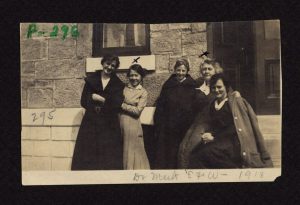
Edith Flower Wheeler, WMCP 1897 with others in 1918
The collections' focal point is women in medicine, however many women believed that the fight for the right to vote and the right to study and practice medicine were the same fight, and both movements benefited from the successes of the other.
The resources described range from the early 1850s until late 1970s and include published sources as well as diaries, a memoir, theses, lectures and lecture notes, and correspondence. Some sources have been digitized and are linked in the guide and others are only available on-site at the Legacy Center.
SPECIFIC INCIDENTS
NAWSA's Dr. Anna Howard Shaw Memorial Department of Preventive Medicine at the Woman's College of Pennsylvania. 1919-1920
Dr. Anna Howard Shaw had three goals that she wanted to achieve in her lifetime: suffrage for women; prohibition; and science being taught as a way of prevention. She dedicated many years of her life to her causes and before her death, in 1918, she saw two of them come to fruition, suffrage and prohibition. To honor her memory, the Woman's Medical College of Pennsylvania planned to start a Department of Preventive Medicine to continue her legacy. Another women's college in the area, Bryn Mawr College, also wanted to honor Dr. Shaw's memory with a Political Science Department and the National American Woman's Suffrage Association (NAWSA) originally planned to only offer the funds to one of the schools. When NAWSA held an event in February of 1920 so speakers from both colleges could stake their case for their plans for a memorial, speakers on both sides made a compelling case. It was decided that both WMCP and Bryn Mawr would receive $30,000 for their respective departments. The narrative of this event spans multiple sources.
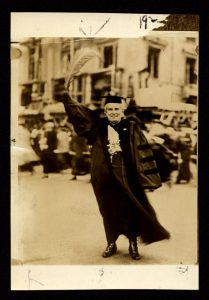
Dr. Anna Howard Shaw
Clippings 1919-1923
Woman's Medical College Bulletin
Woman's Medical Journal
The Iatrian Suffrage Debate
Beginning in December 1911 to March 1912, a series of opinion pieces about suffrage were published in the Iatrian, the Woman's Medical College of Pennsylvania's student journal. The medical students debated the issue of whether suffrage would benefit them.
The Iatrian – The Woman's Medical College's monthly student publication
Women physicians, suffrage, and WWI
When the United States officially entered the WWI conflict in 1917, the US Government sent many male physicians overseas to aid the wounded as ranking officers. Despite female physicians also interested in lending their talents to the cause, the government would not allow them to serve.
Dr. Caroline Purnell's article discusses the tension between organizations as women looked for ways to serve. Women working under the auspices of the National Suffrage Association traveled around the United States to raise money to send women to Europe to aid in the war. The work these groups did became known as the "Over Seas Hospitals," promising women physicians salaries and ranks in the French Army. Purnell argues their promises to be unrealistic and unfounded, and instead, the women physicians should support the work of the American Women's Hospitals (AWH) which sent women doctors throughout Europe to aid people in the war zones recover from the destructive war. Purnell believed deeply in suffrage but believed that the National Suffrage Association was deceiving its recruits. Purnell describes the formation of the AWH, its relationship to the American Women's Medical Association, and its distinction from the National Suffrage Association's "Over Seas Hospitals."
Dr. Mary Buchanan's President's Address to the Alumnae Association of the WMC likens the women's opportunity to gain suffrage to their opportunities to support the war effort. Buchanan describes women physicians efforts to serve despite the government limitations on commissioning women, including the fact that the Woman's Suffrage Assocation paid the salaries of women physicians in France.
Transactions of the Alumnae Board of the Woman's Medical College of Pennsylvania
PUBLICATIONS AND THESES
The Iatrian
Formerly known as the Esculapian, the Iatrian was the Woman's Medical College of Pennsylvania's monthly student periodical. As the suffrage movement was getting more traction in the political sphere in America, the medical students began to talk more about the topic, including what appeared in the Iatrian as a form of public discussion from the years of 1910 until 1913.
Publication Dates
- Esculapian, March 1910, pg. 5
- Iatrian, December 1911, pg. 5
- Iatrian, January 1912, pg. 8
- Iatrian, February 1912, pg. 4
- Iatrian, February 1912, pg. 10
- Iatrian, March 1912, pg. 5
- Iatrian, May 1912, pg. 8
- Iatrian, April 1912, pg. 13
- Iatrian, December 1912, pg. 6
- Iatrian, October 1913, pg. 14
Woman's Medical College of Pennsylvania Clipping Scrapbooks
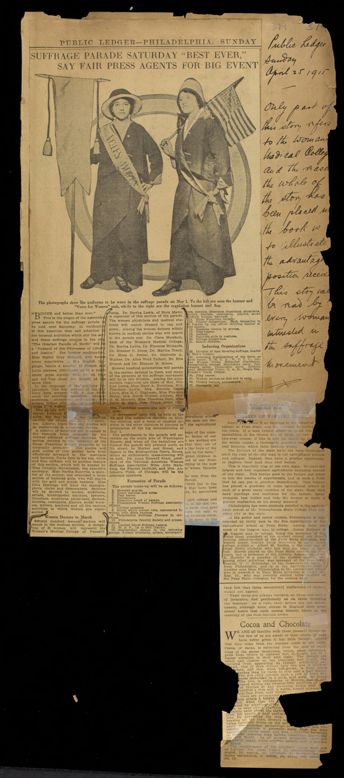
April 25, 1915 Philadelphia Suffrage Parade
The Woman's Medical College of Pennsylvania compiled newspaper and journal clippings from around the nation that mentioned the college and anyone associated with the college in scrapbooks. This specific range of clippings is about women's rights and the women of the college participated in the movement and their opinions dating from 1915 until 1920. The range includes clippings from volumes 5 and 8 of the clippings scrapbooks.
Clippings
- Clippings: Suffrage Parade 1915-04-25, pg 379
- Clipping: Bulletin, 1915-06-04, pg. 421
- Clipping: Public Ledger/Record 1915, pg. 422
- WMCP Clippings: Volume 5; 1914-1916, pg. 429-461
- Clipping: Suffragists to Aid Drive, pg. 594
- Clippings: "Phila. Is After Shaw Memorial," pg. 607
- Clipping: Anna Howard Shaw Preventive Medicine Chair, 1920-02-18, pg. 630
- Clipping: "The Woman's Medical College of Pennsylvania” pg. 640
- Clippings: "Memorial to Dr. Anna Howard Shaw," pg. 650
Bulletin of the Woman's Medical College of Pennsylvania
The quarterly publication of the Woman's Medical College of Pennsylvania. The Bulletins include updates on the college community including faculty, alumni and students. The Bulletins listed below include pieces that are related to suffrage and women's rights from 1915-1930.
Woman's Medical Journal
The Woman's Medical Journal is a monthly publication recording the work of women in medicine around the world. The journals listed include pieces related to the aftermath of women receiving the vote, ranging from 1920-1923.
Woman's Medical College of Pennsylvania Theses
Theses of the Woman's Medical College of Pennsylvania on the topic of the right of women to practice medicine and why women are a necessary part of the development of the profession in general. As more women began to enter into medical colleges, the question of why women should practice medicine was asked more widely and several students addressed the issue in their theses. Theses from 1851 until 1871
INDIVIDUALS AND COLLECTIONS
The individuals named in this section authored or are featured in materials relating to women in medicine (or women medical adjacent) and women's activism, be it suffrage or other movements. These materials may not be the only representation of women's activism in the collections, instead the information presented should be a guide or starting point.
Rachel L. Bodley
Edith Flower Wheeler, WMCP 1897
Anna M. Fullerton, WMCP, 1882
- Anna M. Fullerton Dairies (1915-1933, 5 Vols),
- Dr. Anna Fullerton was interested in the suffrage movement in England and believed that it was fascinating. She also recounts the memories of finding out about the 19th amendment being passed and someone contacting the last living person that attended the 1848 Seneca Falls Convention.
Sarah Hibbard, WMCP 1870
- Lecture Notes, Sarah Hibbard, approx. 1870s, Sarah A. Hibbard M.D. papers, 2nd booklet
Clara Marshall, WMCP 1875
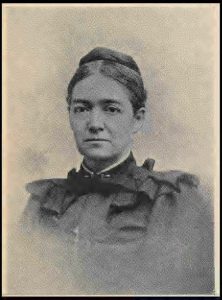
Mary Putnam Jacobi, WMCP 1864. She was a leader in the US suffrage movement.
Mary Putnam Jacobi, WMCP 1864
- Life and Letters of Mary Putnam Jacobi, Edited by Ruth Putnam, 1925. pg. 325-331
- In Memoriam, various authors,1907
- Florence Kelley, pg. 25-30
- "The Mary Putnam Jacobi Fellowship", pg. 83
- "Shall Women Practice Medicine? ”Mary Putnam Jacobi: A Pathfinder in Medicine, The Women's Medical Association, Mary Putnam Jacobi, 1882 pg. 367
- Mary Putnam Jacobi: Common Sense Applied to Woman's Suffrage
Sophia Jex-Blake
Marion Spencer Fay, PhD
- Marion Fay PhD Marion Spencer Fay, Regina Markell Morantz-Sanchez, July 11, 1977, Oral history collection on women in medicine, pg. 4.
Lillian Welsh, WMCP 1889
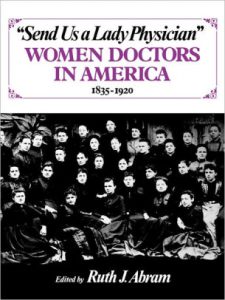
Women Doctors in America, based on Abrams's research of the Class of 1987 from WMCP
Ruth Abram
- Ruth Abram authored "Send Us A Lady Physician" Women Doctors in America 1835-1920. Her collection of research materials includes comprehensive research on the WMCP class of 1879.
- Obituary: Dr. Battershall, Pioneer, Passes On–a252_b10f32_9.1ph15
- Photo: Suffrage Parade 1915–a252_b10f57_11.6ph5
- A Fair Proposition from the Chicago "Lever"
- Mrs. Kemp's Eightieth Birthday
- Agnes Nininger Sabders Kemp
History of the College, Thomas Longshore, approx. 1890s, Martha Tracy papers, pg. 11
- The History of the College was written by Thomas E. Longshore, brother of Dr. Joseph Longshore, co-founder of the Female Medical College of Pennsylvania in 1850. Dr. Longshore led the school in educating women physicians and he hired doctors who were willing to teach them but one particular, Dr. David J. Johnson, became jealous of Longshore's popularity and began attacking him for his progressive beliefs such as Woman's Rights, temperance and mesmerism (hypnotist).
Longshore family papers, Hannah E. Longshore, WMCP 1852
- Pioneer in the Cause for Women Hannah E. Longshore MD
- To commemorate the life of the late Dr. Hannah E. Longshore, Pennsylvania's first practicing woman physician and the second in the country, the Woman's Medical College of Pennsylvania started the Hannah E. Longshore Department of Therapeutics. A pamphlet tells Dr. Longshore's story of breaking the barriers of the typical woman's sphere.
Lucretia L. Blankenburg
- Lucretia L. Blankenburg was the daughter of Dr. Hannah E. Longshore and Thomas Longshore, the niece of Dr. Joseph Longshore that followed in her family's legacy and promoted the advancement of women. dedicated her life to the equality of women and men after watching her mother struggle with the discrimination of being a female physician. She died in 1937 from pneumonia.
- Lucretia Blankenburg address for winning award, 1933 2000.12.12-16/a2000.12_b01f11
- In 1933, Blankenberg received an honorary degree from Temple University. In her acceptance speech she spoke about life growing up and committing to Woman's Rights. She mentions Philadelphia institutions such as Temple University and Drexel University.
- Obituary: Mrs. Lucretia Blankenburg dies, aged 91
- Lucretia Blankenburg died from pneumonia in 1937. Her obituary details her life and how she dedicated her life to the equality of women and men after watching her mother struggle with the discrimination of being a female physician.
Women in Medicine: A Bibliography of the Literature on Women Physicians by Sandra L. Chaff
This bibliography is a compiled list of over 4000 references to books, journal articles, and dissertations dating from 1750-1975. Available online in our digital collections database, the bibliography has a subject index that includes Women's Suffrage and Women's Rights, as well as author and personal name indexes. Indexes lead to numbers that correspond to article numbers. Some titles are in the Legacy Center collections.